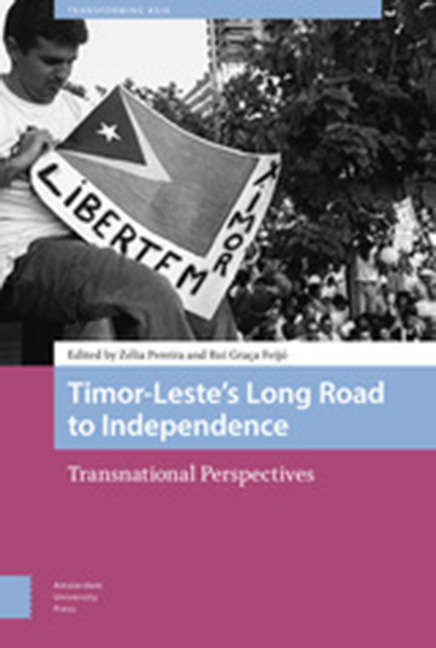Book contents
- Frontmatter
- Contents
- Acknowledgements
- A Note on the Name of the Country
- List of Figures
- Introduction: Timor-Leste’s Long Road to Independence: Outline for an Analytical Framework
- Part One Before The Portuguese Decolonisation
- Part Two The Portuguese Revolution Arrives In Timor-Leste
- Part Three Reaction To The Indonesian Invasion Of Timor-Leste
- Part Four Resisting The Indonesian Annexation Of Timor-Leste
- Index
4 - “Nations-of-Intent”: Competing Ideological Views of Nationalism in Timor-Leste, 1974–1999
Published online by Cambridge University Press: 14 February 2024
- Frontmatter
- Contents
- Acknowledgements
- A Note on the Name of the Country
- List of Figures
- Introduction: Timor-Leste’s Long Road to Independence: Outline for an Analytical Framework
- Part One Before The Portuguese Decolonisation
- Part Two The Portuguese Revolution Arrives In Timor-Leste
- Part Three Reaction To The Indonesian Invasion Of Timor-Leste
- Part Four Resisting The Indonesian Annexation Of Timor-Leste
- Index
Summary
Abstract
In the wake of Portugal's Carnation Revolution on April 25 1974, several East Timorese political parties emerged as Portugal's Armed Forces Movement (Movimento das Forças Armadas) announced a rapid decolonisation agenda. Each bore a distinct “nation-of-intent” or ideological vision of nationalism. The clashes between these nations-of-intent would define the fault lines within early East Timorese nationalism. This chapter applies the concept of “nation-of-intent” to the case of Timor-Leste. It examines these competing conceptions of the nation in Timor-Leste, their evolution over time and the ways these nations-of-intent informed the strategies and organisational evolution of the resistance from 1974 to 1999.
Keywords: nationalism, nations-of-intent, national identity, political Parties
In the wake of Portugal's Carnation Revolution on April 25, 1974, which overthrew the Salazar-Caetano regime, several East Timorese political parties emerged as Portugal's Armed Forces Movement (Movimento das Forças Armadas, MFA) announced a rapid decolonisation agenda. Each bore a distinct “nation-of-intent” (Rotberg 1966; Shamsul 1996), or ideological vision of nationalism (Leach 2017: 55–60). The clashes between these “nations-of-intent” would define the fault lines within early East Timorese nationalism.
Where ASDT (Associaçao Social-Democrática Timorense/Timorese Social- Democratic Association), later renamed FRETILIN (Frente Revolucionária de Timor-Leste Independente/Revolutionary Front for an Independent Timor-Leste) emphasised an independent national identity in the transcommunal figure of the maubere, combined with a modernising secular vision, and links with other Lusophone post-colonial societies; the UDT (Uniao Democrática Timorense/Timorese Democratic Union) promoted continuing visions of a Lusitanian assimilado identity, and a hierarchical Catholic society in continuing association with Portugal. Advocating integration with Indonesia, the smaller party APODETI (Associaçao Popular Democrática Timorense/Asosiasi Demokratik Rakyat Timor/Timorese Popular Democratic Association) reprised ideas of older indigenous unities with the ancient “centre” in Wehale (Molnar 2009: 44), recalling links to West Timor. The Association of Timorese Heroes (Klibur Oan Timor Aswain/Associaçao dos Heróis Timorenses, KOTA) promoted a distinct vision of traditional liurai (traditional king) authority brought into the national realm (Hicks 2015). Later, during the Indonesian occupation, a separate “nation-of-intent” would emerge in the reorganisation of the resistance in the 1980s to a non-partisan front, the National Council of the Maubere Resistance (Conselho Nacional da Resistencia Maubere, CNRM), later renamed the National Council of the Timorese Resistance (Conselho Nacional da Resistencia Timorense, CNRT) in 1998.
This chapter applies the concepts of “nations-of-intent” to the case of Timor-Leste.
- Type
- Chapter
- Information
- Timor-Leste's Long Road to IndependenceTransnational Perspectives, pp. 145 - 168Publisher: Amsterdam University PressPrint publication year: 2023
- 1
- Cited by



